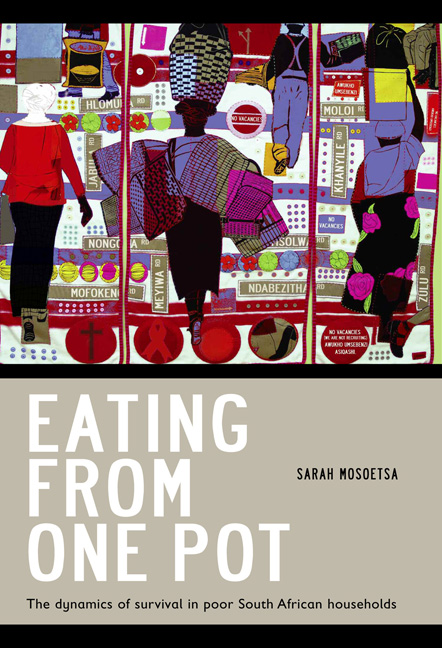Book contents
- Frontmatter
- Contents
- Foreword
- Acknowledgements
- Introduction
- Chapter 1 ‘Sharing the little I have with my family’: the allocative rules of household resources and income
- Chapter 2 ‘My wife does not respect me anymore’: unequal power dynamics in households
- Chapter 3 ‘I remain an ANC member, but …’: civil society in Mpumalanga and Enhlalakahle
- Chapter 4 Theoretical and Policy Implications
- Conclusion: Poor households are fragile sites of stability
- Selected Bibliography
- Index
Chapter 1 - ‘Sharing the little I have with my family’: the allocative rules of household resources and income
Published online by Cambridge University Press: 20 April 2018
- Frontmatter
- Contents
- Foreword
- Acknowledgements
- Introduction
- Chapter 1 ‘Sharing the little I have with my family’: the allocative rules of household resources and income
- Chapter 2 ‘My wife does not respect me anymore’: unequal power dynamics in households
- Chapter 3 ‘I remain an ANC member, but …’: civil society in Mpumalanga and Enhlalakahle
- Chapter 4 Theoretical and Policy Implications
- Conclusion: Poor households are fragile sites of stability
- Selected Bibliography
- Index
Summary
This chapter provides a narrative of household resources and income in Mpumalanga and Enhlalakahle. With the collapse of formal factories in the two areas, described in the previous chapter, and the subsequent absence of wage employment, the household has become the sole node of production for many people. This state of affairs is pushing many households to the brink of collapse. The people in these households are not, as proposed in the livelihoods literature, managers of complex assets. In fact, many of them have almost no assets to speak of, and many households exhibit signs of extreme poverty as their resources diminish. More and more, they are unable to secure alternative and sustainable livelihood sources and income. In such circumstances, people's primary goal becomes naked survival, rather than the development of strategies that might enable them to achieve better livelihoods.
Household income is derived chiefly from state grants and employment in the informal economy. However, the potential of the informal economy – street selling and home-based work – to alleviate income insecurit y is extremely limited. Food becomes the priority. Households spend little on health and education as a result. The cost of essential service s makes household income even more inadequate and exacerbates food insecurity. In such a situation, many households turn to illicit activities such as crime or illegal electricity connections in order to earn additional income or cut costs.
This chapter investigates the response of households in Enhlalakahle and Mpumalanga to the crises of unemployment and poverty. The focus is on household resources, sources of income and the allocation or distribution of income. The next chapter will examine the struggles that emerge in households as a result of a lack of income.
CLUSTERING OR OVERCROWDING?
Poverty and unemployment are changing the structure and size of households as more individual adults and children move to those households where there is a stable income. However, households with a secure source of income are becoming the exception. State transfers have become the panacea. Elizabeth Francis's (2000) research in the North West province of South Africa corroborates this picture.
- Type
- Chapter
- Information
- Eating from One PotThe dynamics of survival in poor South African households, pp. 23 - 55Publisher: Wits University PressPrint publication year: 2011



